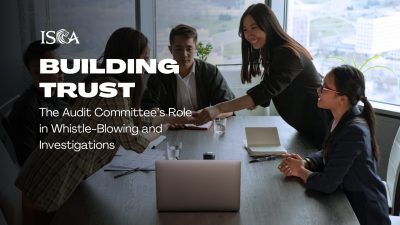
By continuing to use the ISCA Academy website, you agree to the use of cookies in accordance with our cookie policy. Cookie policy
Building Trust: The Audit Committee’s Role in Whistleblowing and Investigations
English
Last updated
Tue, 04-Mar-2025
Course Description
This is an essential e-learning module designed for board members and corporate leaders to understand their role in establishing and overseeing safe and effective whistleblowing channels. The module highlights how a well-structured whistleblowing program fosters transparency, accountability, and trust within organisations.
Participants will explore the legal and regulatory frameworks governing whistleblowing in Singapore, including anti-money laundering (AML) obligations, and learn about the protection mechanisms offered by regulatory bodies such as the Competition and Consumer Commission of Singapore (CCCS) and the Corrupt Practices Investigation Bureau (CPIB).
The course covers practical strategies for developing whistleblowing policies, ensuring confidentiality, investigating whistleblower reports, and maintaining ongoing oversight. It will examine the board’s critical role in monitoring whistleblowing channels, ensuring governance, and promoting a culture of ethical leadership and trust.
By the end of this module, participants will gain the knowledge and tools necessary to lead whistleblowing initiatives that support organisational integrity and risk management.
Module Outline
- Introduction to Whistleblowing and Corporate Governance
- Importance of whistleblowing
- The Board’s Role in establishing whistleblowing channels
- Legal and Regulatory Frameworks for Whistleblowing
- Understanding legal requirements for whistleblowing
- Anti-Money Laundering compliance and whistleblowing in Singapore
- Regulatory agencies’ protection for whistleblowers
- Evaluating and Assessing the Efficacy of the Organisation’s Whistleblowing Policy
- Accessibility and Communication
- Confidentiality and Protection
- Timeliness and Fairness in Handling Reports
- Oversight and Reporting to the Board
- Alignment with Organisational and Legal Standards
- Continuous Improvement and Board Engagement
- Fostering a Culture of Trust through Whistleblowing
- The role of leadership in encouraging whistleblowing
- Building trust through transparency
- Overcoming challenges in whistleblowing
- Board’s role in overseeing Management’s Response to whistleblowing reports
- Future Trends in Whistleblowing
- Increased use of technology and AI for whistleblowing management
- Enhanced Legal Protections and Regulatory Requirements
- Integration of ESG and Ethical Reporting into Whistleblowing Channels

Ee Chuan Yoong
Course Rating
Speaker's Rating


Lesson
6
You have not enrolled to the BOD Programme!
Please click to sign up.
You have not subscribed to the BOD Library!
Please click to subscribe.

Succeed and lead with confidence as a board member. Empower yourself with up-to-date directorship training.
